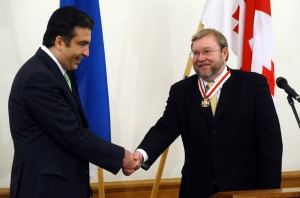What Would the World Look Like if Economists Were in Charge?
In this episode, we speculate what would happen if economists got to run the world. Hear from a high-end call girl; an Estonian who ran his country according to the gospel of Milton Friedman; and a guy who wants to start building new nations in the middle of the ocean.
Finja por un momento que nuestros más altos funcionarios electos, en lugar de actuar como los abogados que son, fueron reemplazados por economistas. Usted escuchará de los economistas Steve Levitt y Russ Roberts, el ex primer ministro estonio Mart Laar, y de un nieto de Milton Friedman sobre este futuro supuestamente prometedor.
Acabamos de lanzar el tercer episodio de nuestro podcast Freakonomics Radio (aquí en iTunes; fuente RSS aquí; escuche la transcripción; o escuche en vivo a través del cuadro de la derecha), y este llega al corazón de muchos lectores. Hace una simple pregunta especulativa: ¿Cómo sería el mundo si los economistas estuvieran a cargo?
Escuchará un poco de Steve Levitt sobre la visión del mundo del economista en general, y cómo difiere de la del político. También escuchará al muy perspicaz Russ Roberts, profesor de economía de la Universidad George Mason que también escribe en su blog, tiene un podcast propio, escribe libros y produce videos de rap. Aquí hay un corte de la entrevista de Roberts:
SJD: Okay, let’s play a fantasy game for a minute and pretend that you, Russ Roberts, a creative and very bright economist come to Washington and are put in charge of the whole country. And unlike every other economist that’s ever gone to high office, you don’t start acting like a politician. You really act like an economist from day one. So you get there, you’re behind the desk, you’ve got a pen and paper. What are some of the first things you do as soon as you arrive?RR: I’m getting goose bumps, it’s so exciting. Well, what I would do? Let’s start with some obvious things. I would get rid of the Department of Commerce. The Department of Commerce doesn’t do anything except subsidize exports, which is just a way of saying it makes certain companies rich at the expense of the rest of us. So I don’t think the Department of Commerce does anything particularly useful, I would get rid of that. I’d get rid of the Department of Education. I don’t think that the Federal Government has any productive role to play in the school system. I’d get rid of all tariffs. I’d let people be free to buy whatever they wanted from all around the world. What else? I would get rid of the minimum wage law, which I think makes it hard for low-skilled people to find work; it makes them artificially expensive. I’d change the Federal Reserve. We spend a lot of time trying to find the right interest rate. That’s a fool’s game that has contributed to the current crisis. So I would change the Federal Reserve. I would certainly at a minimum require it to only care about price stability. Right now it cares about price stability, unemployment, the health of the stock market, Wall Street salaries, evidently. So I would get all of those things out. It’s going to be hard to do legislatively, so I would probably replace the the Fed with a Friedmanite fixed growth and money supply or just abolish it entirely and let private money emerge. I’m getting out of control here.
ML: First of all, when you grow up and develop under the Communists, then first of all you see what is not working, and that means that the Communism is not working and all those left-wing socialist ideas of state control and so on, they are just not working. They are against the human nature, and they will fail. Which means that when you read the Soviet newspapers about one man who is especially dangerous, especially crazy, and absolutely mad, and we should destroy all the human beings and the economies and so on, and this man was called Milton Friedman. And of course I became interested and when I first read Milton Friedman, it was my first book on economy that I ever have read. Then of course I was very interested because I think most of the ideas were simple but here they looked like work. And when I became the prime minister I decided, Why not.


